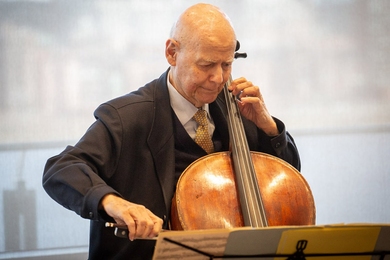An award-winning book by Associate Professor of History Jeffrey Ravel examines a bygone feature of French theater that contributed to the intellectual and social ferment leading to the French Revolution.
The Contested Parterre: Public Theater and French Political Culture, 1680-1791 won the 1999 Barnard Hewitt Prize for best book on theater history, given by the American Society for Theater Research.
The Contested Parterre is an illustrated history of the social and political role of the "parterre," the area immediately in front of the stage in French theaters. The "parterre," known to modern theater-goers as the top-price orchestra seats, once served as a sort of holding pen for students, intellectuals and others who milled about, talked too much and threw things at the actors if they grew restless or disgruntled with the play. Occasionally, aristocrats also stood in the pit, both for its view of the stage and for its ambiance.
The parterre provided spectacle for those in the boxes who could look down, literally, on a constant drama interrupted now and then by police raids. Those standing in the parterre could also, literally, gaze up towards the bejewelled elite. Thus the theater reflected social hierarchies in prerevolutionary France.
But, said Professor Ravel, the parterre's cheap seats dearly cost the very court that spawned it. The parterre contributed to the downfall of the aristocracy in the French Revolution of 1789 by serving as a marketplace of subversive ideas.
"People have compared the parterre to the mosh pit of rock and roll concerts, and, in a way, it was. Crowded with people from every walk of life -- anyone could wander into the parterre, and intellectuals and aristocrats did just that -- the parterre was a place in which individuals of all classes were exposed to the ideas of Rousseau and Voltaire. It was where the court met the street and where ideas from the streets met the court," he said.
The French Revolution, of course, transformed Paris into one gigantic parterre, and the court and its symbols were destroyed. So, too, was the parterre. By 1791, the French had instituted modern theater seating whereby a seat's ticket price was inversely proportional to its distance from the stage, limiting intermingling between economic classes -- a plan that persists today.
Professor Ravel cited French police archives as his main research source.
"In the 20 years preceding the Revolution, violent clashes between the audience and the police increased. As the 'street' sense of entitlement grew, so did the audience's willingness to protest and to react to the content of plays they saw. From 1750 on, royal soldiers with bayonets drawn marched around the parterre. People were killed. The police records reveal events that became historically significant," he said.
Professor Ravel received the BA degree from Colgate in 1983 and the PhD from Berkeley in 1991. He worked as a paralegal before beginning his graduate studies in history. Two high school teachers inspired him to write The Contested Parterre, Professor Ravel said. "I was a big drama jockey, and my French teacher was passionate about French culture.
"I'm thrilled to win this award," he said. "I trained as a historian and I'm pleased to teach in the history faculty here, but I'm also excited that my work has found an audience among theater-studies scholars."
A version of this article appeared in MIT Tech Talk on December 13, 2000.





